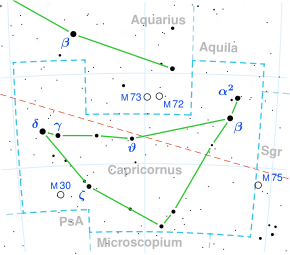Alpha Capricornids
| Alpha Capricornids | |
|---|---|
 Celestial map of Capricornus | |
| Discovery date | 1871 |
| Parent body | 169P/NEAT (2002 EX12)[1] |
| Radiant | |
| Constellation | Capricornus |
| Right ascension | 20h 44m 00s |
| Declination | −10° 00′ 00″ |
| Properties | |
| Occurs during | July 7 to August 15[2] |
| Date of peak | July 31[2] |
| Velocity | 23 km/s |
| Zenithal hourly rate | 5 |
Alpha Capricornids is a meteor shower that takes place as early as 7 July and continues until around 15 August.[2] The meteor shower was discovered by Hungarian astronomer Miklos von Konkoly-Thege in 1871.[3] This shower has infrequent but relatively bright meteors, with some fireballs. Parent body is comet 169P/NEAT.
Peter Jenniskens and Jeremie Vaubaillon identified the parent body as asteroid 2002 EX12, which in the return of 2005 was found weakly active near perihelion.[1] This object is now called comet 169P/NEAT.
According to Jenniskens and Vaubaillon, the meteor shower was created about 3,500 to 5,000 years ago, when about half of the parent body disintegrated and fell into dust.[1] The dust cloud evolved into Earth's orbit recently, causing a shower with peak rates of 2-5/h, sometimes having outbursts of bright flaring meteors with rates up to 5-9/h.
The bulk of the dust will not be in Earth's path until the 24th century. The Alpha Capricornids are expected to become a major annual storm in 2220–2420 A.D., one that will be "stronger than any current annual shower."[1]
References
[edit]- ^ a b c d Jenniskens, P.; Vaubaillon, J. (2010). "Minor planet 2002 EX12 ( = 169P/NEAT) and the Alpha Capricornid shower". Astronomical Journal. 139 (5): 1822–1830. Bibcode:2010AJ....139.1822J. doi:10.1088/0004-6256/139/5/1822. S2CID 59523258. Retrieved 8 July 2014.
- ^ a b c Robert Lunsford (21 July 2022). "Meteoric Activity for 23-29 July 2022". MeteorNews. Retrieved 21 July 2022.
- ^ "Alpha Capricornids: Encyclopedia Article". Encarta.msn.com. Encarta. Archived from the original on 19 April 2009. Retrieved 8 July 2014.
External links
[edit]- Interactive visualization of Alpha Capricornids meteor stream
- -4 magnitude Alpha Capricornid shooting past Delphinus on July 17, 2006. Sigma 20 mm f/1.8
| By name |
|
|---|---|
| By peak date | 
|
| Related topics | |
| |
Text is available under the CC BY-SA 4.0 license; additional terms may apply.
Images, videos and audio are available under their respective licenses.
